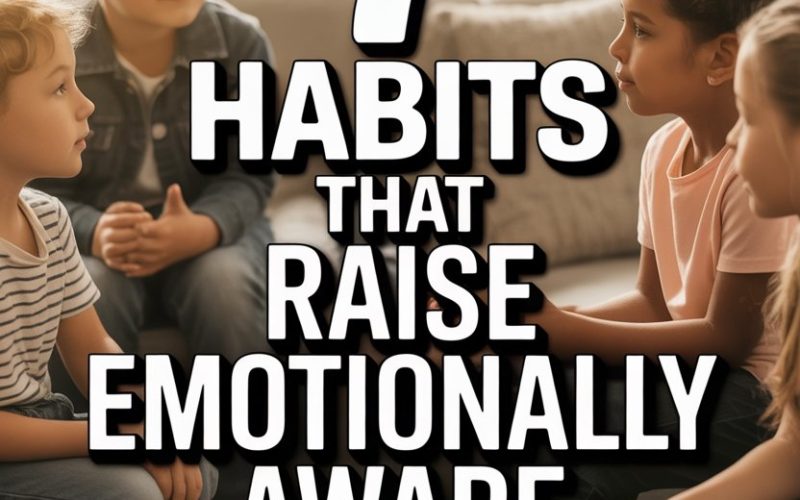Parenting is a wild ride, often featuring a supporting cast of yoghurt stains, mysterious smells, and feelings — so many feelings.
Amidst all the to-dos, there’s a superpower you can help your child develop: emotional awareness.
No, it won’t guarantee your kid never hurls a biscuit at their sibling, but it does set them up for empathy, self-regulation, and lifelong resilience.
Here’s the blueprint for raising emotionally clued-in children—habits you can start practicing long before the bedtime meltdown even begins.
1. Name Feelings Out Loud
Turns out, children aren’t born with a magical vocabulary for what’s going on inside their heads (shocking, I know). They learn from hearing you name emotions—yours and theirs—out in the open.
Narrate your own emotions: “Mum’s feeling frustrated because the toast just jumped out of the toaster and made her spill her tea.” Or, “Looks like you’re sad because it’s raining and we can’t go to the park.”
When you put words to feelings, you’re handing your child a toolbox for self-expression.
The magic here isn’t just for the under-fives. Even older kids can benefit from the running commentary.
According to a research, children exposed to emotion talk at home show higher empathy scores and better friendships. And who doesn’t want their child to be the mate everyone trusts with their secrets?
2. Show Them How to Handle Strong Emotions
Little people, big feelings—and yes, sometimes big voices, feet, and emotional outbursts. Modelling what you do when your own feelings are running the show is pure gold for kids.
Try something like, “I’m feeling really angry right now, so I’m going to take five deep breaths before I answer.” Or, “I’m upset because we’re late, so I’m just going to count to ten before we leave.”
It isn’t about always being zen (honestly, who is?), but about showing your child that feelings can be managed, not just endured.
Worried that admitting your emotions will make you seem less in control? Not so.
Child development experts at Zero to Three assure us that kids thrive when adults model honest emotions paired with healthy coping strategies.
3. Prioritize Listening Over Lecturing
When your child’s feelings are bubbling over, your inner monologue might go: “Here’s what you SHOULD do…” Pause. Breathe. Listening is often your best move.
Get on their level (literally, crouch down if you must). Give them your attention—even if your phone is pinging and the pasta’s boiling over.
Reflect back what you hear: “You’re really upset because your block tower broke. That makes sense.”
Active listening isn’t just a nice parenting moment; it’s the foundation for emotional safety.
Harvard’s Center on the Developing Child highlights that children who feel heard are more likely to share, self-regulate, and trust others.
Resist the urge to solve, fix, or monologue—at least until the storm passes. Sometimes, a sympathetic ear is all they need.
4. Use Books, Stories, and Media as Emotion Bootcamps
Classic fairy tales aren’t just for bedtime procrastination—they’re packed with emotional lessons.
When you read or watch TV with your child, pause to ask, “How do you think that character feels right now?” or “What could they do about it?”
Point out facial expressions, tone of voice, and body language. Turn it into a game: Who can spot the happiest (or angriest) character in a picture book?
Books like “The Color Monster” by Anna Llenas are fantastic for starting conversations about feelings.
Children’s TV is another resource hiding in plain sight. Research found that shows featuring characters expressing a wide range of emotions help young viewers become more emotionally literate.
If you’re stuck listening to the same bedtime story for the 37th time, just know: you’re building emotional awareness, not just memorising plotlines.
5. Make Room for All Emotions—Even the Messy Ones
Everyone loves a cheerful child. But what about the days when your little one is grumpy, jealous, or just plain cross? Instead of shushing, distracting, or bribing them out of it, try welcoming those feelings.
Say, “It’s okay to feel angry that your friend didn’t want to share today.” Or, “I get it, it feels awful when plans change.”
Normalising the full spectrum of emotions helps kids feel less ashamed and more willing to talk them through.
Suppressing feelings can backfire. According to a study from the Journal of School Psychology, children who are taught to accept and regulate (not suppress) emotions are more resilient and have lower risks of anxiety.
It can be tough to sit with a mopey kid (especially when you need to get out the door ten minutes ago), but you’re helping them learn that all feelings have a seat at the table—and none need to be swept under the rug.
6. Practice Apologizing and Repairing
Ever snapped at your child after a rough day, then wished you could take it back? Turns out, you can—sort of.
Modelling how to apologize and repair a relationship teaches kids that mistakes are part of being human.
Try, “I yelled because I was frustrated, and I shouldn’t have. I’m really sorry. Can we have a cuddle?” Or, “I didn’t listen as well as I should have. How about you tell me again?”
This isn’t weakness; it’s a masterclass in humility and problem-solving.
Stanford University’s child psychology department notes that kids learn the art of empathy and reconciliation by watching adults own up to their missteps.
Bonus: you’re less likely to stew in parental guilt for the rest of the evening.
If you’re worried your child will lose respect for you, just remember: children respect honesty far more than perfection.
7. Celebrate Progress, Not Perfection
Nothing makes a parent feel more like a motivational speaker than cheering on those small emotional wins. Notice when your child shares, waits their turn, or names their own feelings.
“You were really patient while your brother had the remote. That was kind,” or, “I saw you take deep breaths when you were upset. That was brave.”
Research published in the Journal of Child Psychology and Psychiatry suggests that children who receive positive feedback for emotional skills (not just achievements) make bigger strides in self-awareness and empathy.
Don’t expect overnight transformation. Some days will feel like you’re raising a philosopher king; other days, more like a tiny, emotional tornado.
Every bit of progress counts.
For older kids, try chatting about emotional wins at dinner (even if you have to bribe them with pudding).
Kids love knowing you notice when they’re working on their feelings, just as much as you notice when they finally put their socks in the laundry basket.
Emotional Awareness: The Gift That Keeps on Giving
Raising emotionally aware kids isn’t about raising perfectly calm, Zen-like mini-adults. It’s about helping your child know themselves, weather their storms, and understand others.
Will there still be tantrums? You bet. But you’ll both have better tools (and maybe a few more laughs) along the way.
You don’t need a PhD in psychology, a Pinterest-perfect home, or an endless supply of patience. Just a willingness to show up—feelings and all.
And possibly, a secret stash of chocolate biscuits for those “teachable moment” days.




